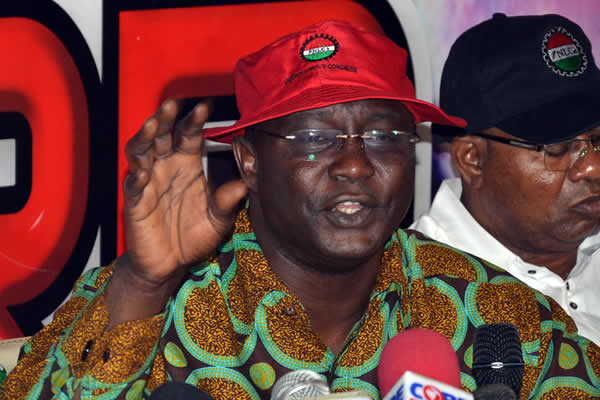
Reactions have continued to trail the latest upward review of Premium Motor Spirit (PMS) price, popularly known as of petrol, from sectorial leaders and economists.
The Nigerian National Petroleum Corporation (NNPC) had, on Friday, through its subsidiary, the Petroleum Products Marketing Company (PPMC), announced N153.17 ex-depot price in its PMS price proposal for November, putting the landing cost of petrol at N128.89 per litre, up from N119.77 per litre in September/October.
The over N7 increase in the ex-depot price immediately translated into increase in pump price. By yesterday, most filling stations in the Lagos metropolis were selling to motorists between N168 and N170 per litre.
Meanwhile, the Organized Labour declined to react.
A top official of Nigeria Labour Congress, NLC, who spoke to Sunday Vanguard on condition of anonymity, claimed that labour leaders and government had not resolved issues surrounding the last hike in electricity tariff and petrol pump price.
The NLC and Trade Union Congress (TUC) had been at the forefront of the rejection of the last hike.
They even threatened to call out workers on strike.
But the official, who spoke to Sunday Vanguard, yesterday, on the latest hike, said Labour had nothing to say for now. “We have nothing to say for now over the new pump price of petrol. In fact, we are still discussing with the government on issues surrounding the last price increase and the hike in electricity tariff”, he stated.
READ ALSO: Petrol stations to sell fuel at N167-N175/litre, as PPMC hikes ex-depot price
“If you are following the discussion, the joint committee of government and Labour on electricity tariff has only submitted interim report not long ago. The committee is still working. So also, issues surrounding the last hike in the pump price of fuel have not been fully trashed out and implemented . So, for now, we have nothing to say publicly.
“I can tell you that there are several issues surrounding the fuel pricing that need to be looked into . Like I said, we have not concluded issues surrounding the last increase which made us to suspend our planned industrial action. This is what I can say for now.”
However, in a telephone interview with our correspondent, Comrade Emmanuel Okechukwu Ugboaja, NLC General Secretary, who said he was speaking in his personal capacity as a labour leader, described the latest increase as “unacceptable”, especially as workers were yet to recover from inflation as a result of the impacts of COVID-19 and #ENDSARS protests.
Dr. Muda Yusuf, Director General of the Lagos Chamber of Commerce and Industry, on his part, said the way out of this petrol pricing and deregulation conundrum is to accelerate the process of domestic refining of petroleum products and creation of a competitive market framework.
According to Yusuf, a deregulated pricing regime is typically volatile, oscillating with global oil price. However, deregulation without competition, he said, would not give desired outcomes. “We are still immersed in a monopolistic structure even as we claim to have deregulated the Petroleum downstream sector. The economy and the citizens cannot get the benefit of deregulation under the current arrangement. The NNPC is still a monopoly in the supply of petrol. Private sector players in the sector have no access to foreign exchange to import petrol and the refineries are still comatose. Government needs to urgently put appropriate structures in place for the deregulation regime to achieve its objectives”, the LCCI D-G said.
He said there should be a level- playing field. “Otherwise, the deregulation policy faces a major risk of being derailed. If this happens, we would be back to the subsidy regime with all the attendant inefficiencies and corruption”.
Yusuf said to cushion the effects of petrol price increases on domestic prices, there is an urgent need to scale up investment in mass transit transportation systems. The power sector recovery programme should also be accelerated to reduce the dependence of MSMEs on petrol powered electricity generators.
“These two areas of intervention would reduce the adverse impact of petrol price volatility on small businesses and the welfare of the citizens”.
Also speaking on the hike, Mr. Teslim Shitta Bey, Proshare Managing Editor, said the deregulation of the downstream segment of the local oil and gas market means that local retail prices will adjust to international oil price fluctuations. The problem is not fluctuations but downward price stickiness.
If international prices fall then local prices should equally drop, if international prices rise then an adjustment would need to happen locally. An additional problem with the local market is the supply monopoly of NNPC”, he said.
Shitta Bey stated that the fact of unequal access to foreign exchange and the inability of other downstream companies to import white products is indicative of local market distortions that need to be addressed.
Vanguard News Nigeria
The post PETROL PRICE HIKE: Labour silent amid public outcry appeared first on Vanguard News.














![[Music] Brisco Ft Meddy _ On God](https://1.bp.blogspot.com/-rjroVTQC4fc/Xqqrc7SrVNI/AAAAAAAABoQ/O9lNUBxpG3ErBDFxTXyyiNC6gEhblQ6lACLcBGAsYHQ/w680/brisco%2Bft%2Bmeddy%2BFINAL.jpg)







0 Comments
Advertise your business here at cheap rate and get large audience to your market. Call/Msg Teemikemedia: 07060733664 to get started.